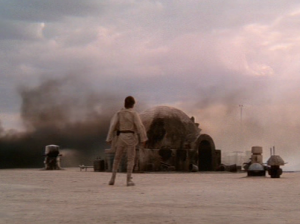
I have a confession to make: I’m a tvtropes addict. Fortunately, it’s only about as bad as vicodin, which means that doses which would knock other people out do nothing to me–but still, I’ve wasted many, many hours on that site.
So anyhow, I thought it would be fun to do a weekly series where I pick out a trope and discuss it. After a lot of deliberation (and much clicking), I decided to start with:
This trope stems from one of the stages of the archetypal Hero’s Journey. The hero usually starts out in some sort of familiar setting, so that the reader gets a sense of who he is and where he’s coming from. To get the story started, someone or something from the realm of the unfamiliar calls him to leave on an adventure.
Most of the time (but not always), the hero turns down the call at first, not wanting to leave his comfort zone. This is called the Refusal of the Call, and it happens a lot. In The Matrix, Neo refuses to climb outside the window to escape the agents. In Ender’s Game, Ender Wiggin doesn’t actually want to go to Battle School, he just wants to be a normal kid and stay with his sister Valentine. In Star Wars IV, Luke tells Obi-Wan that he can’t go to Alderaan because he’s needed on the farm.
Unfortunately, the Call is not so easily evaded.

Sometimes, the best way to send a character off on an adventure is to have him lose everything right at the very beginning. With nothing to hold him back, the hero is free to go off and do something truly reckless.
I still remember how I felt when I first saw the burning homestead scene in Star Wars IV. The sinking feeling when I saw the smoke billowing from Luke’s house, the wide-eyed gasp at the mangled bodies of Luke’s aunt and uncle (I was so young, I had to close my eyes for that part). All of a sudden, the conflict felt a lot more real–and a lot more inevitable.
Of course, this trope only works for a certain kind of story. If the hero’s family is dead before he even leaves his home, there had better be some serious action later on. Also, the villain had better be the real thing–if nothing else in the story lives up to the depravity at the very beginning, a major promise has been left unfulfilled.
Alternately, I suppose you could have the hero’s family killed off by a natural event, or an unintentional accident–something where he has no one to blame and no face to put to the tragedy. I can’t think of any examples of this off the top of my head, but it seems a plausible motivation for, say, a scientist who wants to find a cure for some disease, or the source of some magnificent and dangerous anomaly.
Now, if I were an overlord, I would avoid this trope altogether by cozying up to the hero’s parents, perhaps even sending them Christmas cards. I might consider imprisoning them alive as collateral, but that would give the hero too much of an incentive to storm my castle. And of course, when slaughtering villages, I would make absolutely certain that everyone in the village is dead.
So what do you guys think of this trope? Any other cool examples you can think of, or interesting ways to subvert it? Let me know!
I like how you explained this Trope . . . Hero’s journey. I’m horrible at this stuff, and I could read your post over and over again.
Thanks for turning me on to this trope. Now I shall go and look for it in other places.
Thanks guys! Don’t worry; I plan on doing many more posts like this in the future. Many, many more…